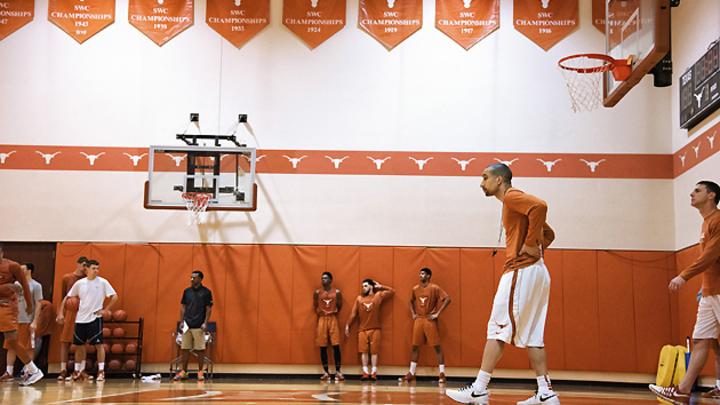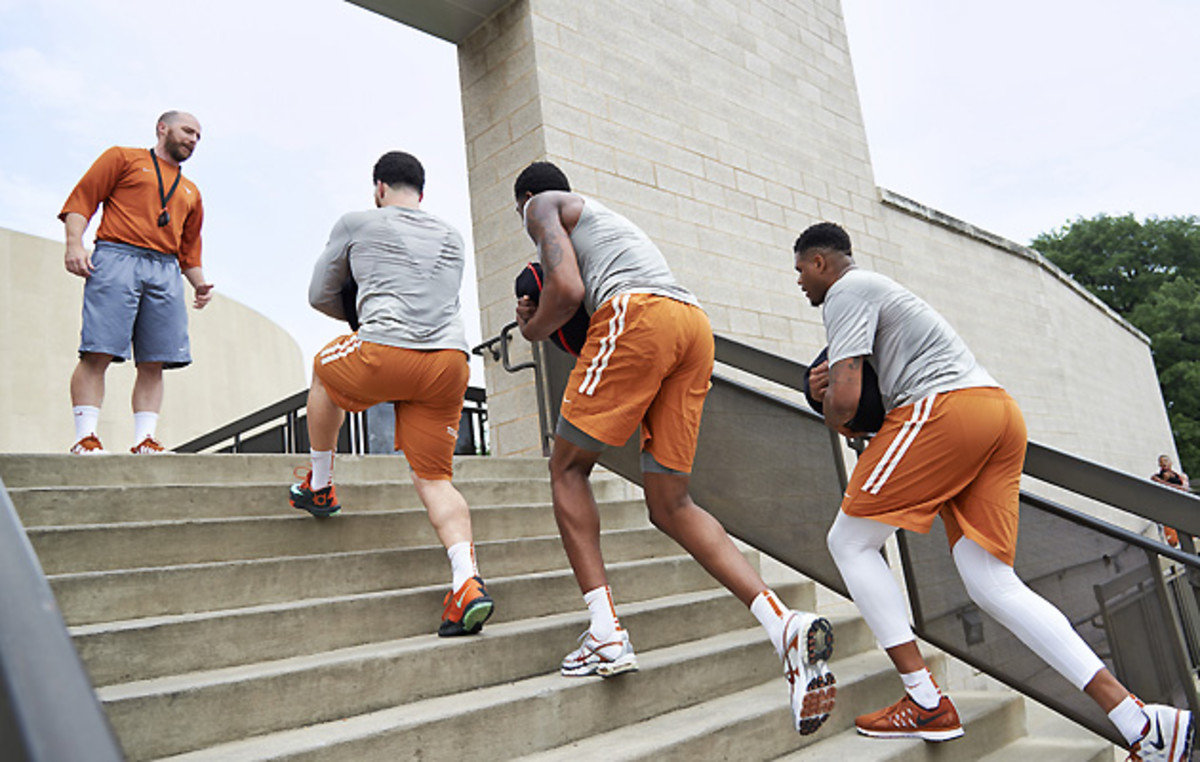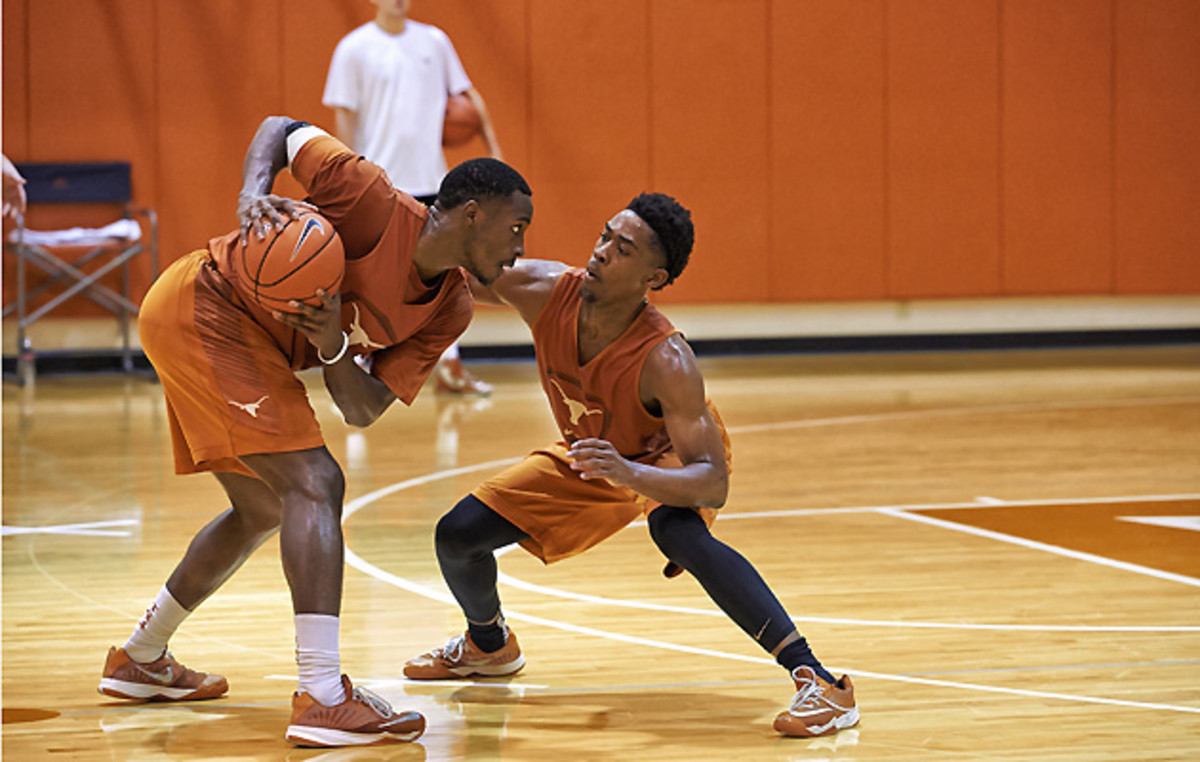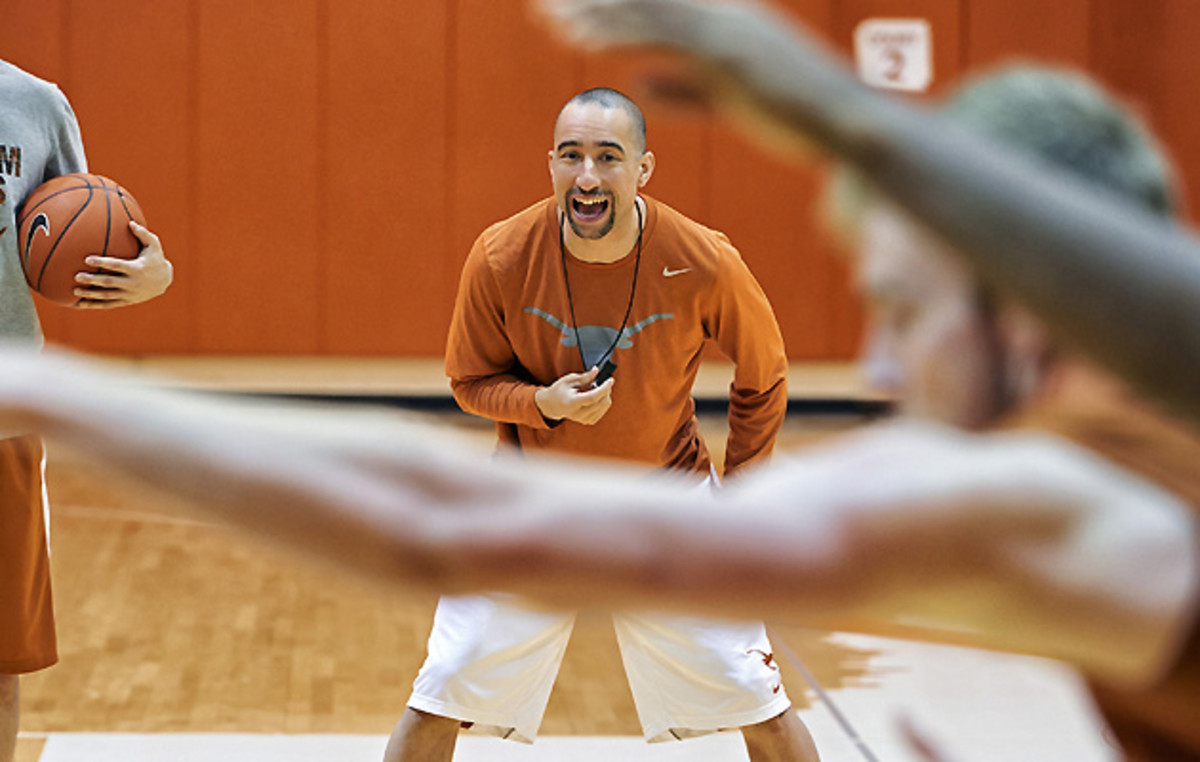Attack the Day: Shaka Smart instilling his style in first summer at Texas

This story originally appeared in the August 3, 2015, issue of Sports Illustrated. Subscribe to the magazine here.
At 2:36 p.m. on Tuesday, June 23, Shaka Smart surveys the Texas basketball weight room. There's an expectant murmur of activity before another breakneck conditioning session begins at the top of the hour. Players trickle in. Assistants make small talk. Smart, who left VCU last spring and became the hire of the college basketball off-season, sets his gaze upon junior guard Kendal Yancy, who is rolling out a leg muscle.
It is Enthusiasm Tuesday. Smart assigns one of his five core values—appreciation, enthusiasm, competitiveness, teamship and accountability—to each day of the week. Today he has asked his team to infuse passion into every activity. This helps explain why the 38-year-old coach is creeping slowly across the room, crouching like a predator in the underbrush. In a burst Smart pounces on Yancy's back and attempts to wrestle him to the floor.
Smart and the 20-year-old player grab at each other's legs and apply headlocks, standing up only to tumble to the green turf again. The struggle lasts for a couple of minutes and ends with Smart on his back. Yancy releases his grip, and Smart jumps to his feet. There is a rule, after all, in his program: If you're down, you have one second to get up. Smart then spies senior guard Javan Felix, one of many amused observers.
"You're next!" Smart barks.
With heaps of in-state talent, abundant resources and a nationally recognized brand, Texas has the capacity to be a powerhouse program, but the Longhorns have appeared in just one Final Four since 1947. Over two summer days SI got an inside look as Smart and his staff began the process of rewiring—psychologically and tactically, on the floor and off—a team that hasn't reached the Sweet 16 since 2008. Maybe the new coaches will extract every drop of potential and win championships. Maybe the system and philosophies won't translate to the major-conference level. What is clear is that the Longhorns will be fast and aggressive, and they'll have a lot of fun.
They may not exactly replicate Havoc, the defensive scheme and way of life that elevated VCU to national prominence in Smart's six seasons there. But Smart has the Longhorns thinking his way so far. "We want to go out and just manhandle people," senior guard DeMarcus Holland says. "When we step [off] the court, win or lose, you know you had a fight."
*****

The squawk of a whistle breaks the silence on Dozier Court at 6:30 a.m. on June 22. "Make sure this is our best week of the summer," Smart says in a prepractice huddle. "It starts now. Doesn't end until Friday. Make this the best week yet."
Smart is gifted with uncommon charisma and a relentlessly positive outlook, but he is just like every other coach taking on a new job. He must motivate strangers to buy what he is selling. This is Appreciation Monday, and Smart gives every player homework. Each must demonstrate nonverbal appreciation to someone that day—a hug, a smile—and report back. "It's tough to do," says Holland, who will fulfill his duty by hugging the strength coaches, "but he wants to hear about it." Smart demands that his players live his core values.
The Texas staff believes that nurturing strong relationships is fundamental to getting players to buy in. "The way that we want to play starts well beyond those lines," says assistant coach Mike Morrell, who was on Smart's VCU staff for four years. Days after he was hired on April 3, Smart dropped by the apartment shared by Felix and senior centers Cam Ridley and Prince Ibeh to watch the NCAA tournament championship game. Not long after that, forward Shaq Cleare was finishing homework in San Jacinto Residence Hall when his phone buzzed. Smart was asking if he could visit. Then the new coach alerted guard Isaiah Taylor. "He texted me, 'I'm at the dorms,'" Taylor says. "I'm like, What? What are you doing here?" The three watched NBA games, talked about life, family and the coaching change. "It's just a good feeling," Taylor says. "Never seen a coach in a dorm before."
"I'm not doing it to make them surprised," Smart says. "Every coach has his style, and no one way is necessarily the best. I just try to be around these guys. The relationship part of it is what's going to allow us to move to the next step."
Smart is interested in more than just hanging out. When Felix failed a test in a psychology class in April, Smart told the veteran guard to forget it and just do everything he could to ace the next one. Felix studied harder, even getting some help from Smart in the coach's office, and passed the course. "It's just a positive, aggressive mind-set, if that makes sense," Felix says. "Attack the day—that's what he says all the time. Just attack the day and do what you can do to get better." The Longhorns don't rip former coach Rick Barnes, but some say he was too focused on the negative. Says Ibeh, "[Barnes] would point out things like, We've missed some of our expectations and goals, and we're in danger of missing them completely, or missing the tournament. You keep that in the back of your mind and still try to focus on playing, it's just difficult."
*****

Strength coach Daniel Roose, another VCU import, has a white Texas basketball binder on his desk with the phrase Transform Your Body on the cover. It is not enough to be in great shape to play for Smart. You must evolve. Before the first practice on this Monday, the no-nonsense Roose threatened tardy players by wielding a four-foot wooden pole that had duct tape on one end, from the time he broke it over a countertop. "He can kind of be a jerk, and guys like it," Smart says. "Kids respond to him being a hard-ass. They don't like that from me."
To that point: Roose brought several pictures of wild dogs along from VCU, and one occupies the lower right corner of the white board featuring the day's schedule. The dog's name is Darius, in honor of former VCU player Darius Theus, and he is a visual cue to the Longhorns of what the coaching staff is after. Before a 2 p.m. Monday workout, Roose challenged the players—"This morning, as a group, we were not ready," he said—and then a well-choreographed hell broke loose.
The next 40 minutes were a blur. Roose demonstrated how to start a shuttle-run drill on all fours. "I don't care how you get up," he said. "Do it fast." The players then sprinted to a weightlifting station. After a set they hustled to do the shuttle run. The sequence repeated without rest. There were no water breaks. Roose screamed the whole time. Sometimes at the whole group—"Pace! Pace! Pace! We gotta go!"—or sometimes at an individual, such as when Taylor was executing a trap-bar deadlift. "Attack! Attack!" Roose barked in his ear as teammates surrounded the junior guard and clapped.
"Monday my voice is really good," Roose said. "It's all downhill from here."
The players understand what their new coaches are after in these daily torments. "You can't go into Lawrence, Kansas, and win without being a dog," says 6'9" forward Connor Lammert. "There's a method to what they're doing. They're turning us slowly into ravenous beasts."
A few hours after Monday's afternoon workout, Smart joined some of his Longhorns and Roose at the training table. When Holland sat down, Roose remarked that the senior had kept the evening's streak alive: Not one player put a vegetable on his tray.
At the other end of the table, Smart smiled.
"The corn bread has jalapeños," he said.
Over dinner Smart asked players about the Confederate-flag controversy in South Carolina. They discussed NBA free agency. Smart asked if anyone was excited about the season-opening game in Shanghai, where the Longhorns will play Washington.
After debating next year's Batman v Superman film—"Who you got in that? I got Superman," Smart said—the table cleared out. In a few hours it would be Enthusiasm Tuesday. Smart told his players not to show up for morning practice unless they have "crazy" enthusiasm. Hearing this, Holland insisted he would outenthuse his coach.
"You're not going to have more than me," Smart said.
"I will," Holland replied.
"We'll see," Smart said.
*****

Adopting Havoc does not necessarily mean that Texas's tempo will be among the fastest in D-I. When VCU reached the Final Four, in 2010--11, Smart's team was the slowest in his tenure with the Rams, ranked 196th nationally in tempo (possessions per 40 minutes, adjusted for opponent) according to kenpom.com. VCU had a top 25 ranking in tempo just once, in '13--14. But Texas fans should notice a difference this season, after the Longhorns ranked 300th nationally in tempo in '14--15. With a roster stocked with athletic guards and wings, Smart will not apply the brakes often.
Holland (46.4% from three-point range in 2014--15) can be a floor-spreader, and the Texas staff knows they could have a post force in the 285-pound Ridley, who averaged nearly a double double as a sophomore (11.2 points, 8.2 rebounds) before dipping to 8.0 and 5.3 last season. In May, assistant coach Darrin Horn visited Ridley at home in Houston to reinforce to Ridley's family how he fit the system.
Then there is Lammert, a 6'9", 240-pound senior who has the potential to be a true stretch four and thus a matchup problem if he plays with more confidence. "He's the one that could really change things," Horn says of the forward who hasn't averaged more than 5.8 points per game in his career.
Taylor, the 6'1" guard who led the team in scoring last year (13.1 ppg), will be at the center of everything. He returned for his junior season due to a combination of lukewarm evaluations from the NBA, the prospects of Texas's new system and a recommendation from ShawnDre' Jones, a former AAU teammate now playing for Richmond, VCU's crosstown rival. "Man, y'all got a good coach, and you're going to like him," Taylor recalls Jones saying.

Jones was right. Taylor says he collapsed in the locker room for about 90 minutes after his first summer workout—"It was just so hard to move," he says—but he looks more muscular. Taylor is custom-fit for an offense that requires guards to create. He has the physicality to be voracious in ball-screen defense; during one practice Taylor harassed Eric Davis Jr. until the freshman fell to the floor. The key now is for Taylor to learn to impart his confidence to everyone else instead of sagging when a teammate can't match his level of intensity or talent. "He's gotten tremendously better," says assistant David Cason. "A lot of the great players have some of the same traits—Hey, I can do that, why can't you? Once he channels that, we'll have a chance."
Taylor merely wants a chance at atonement, after a disappointing sophomore experience in general. "It wasn't satisfying at all," he says. "We had big expectations, and we didn't meet [them]. I [broke my wrist in November], came back, got back in my groove, but we were still losing games. The cohesion wasn't there for the team. I think we're getting that back now. The new staff, they bring something that we were missing last year."
It is a tricky thing, teaching on-court energy, especially to a roster of veterans. It starts with Smart and his coaches being the example. Smart has been known to dive for loose balls, and his assistants—Morrell, Cason and Horn—jump into full-court pressure drills. Celebrating small victories is common; Smart spikes a ball to the floor with two hands if he sees something he likes. Others are even more demonstrative. After the Longhorns hit all five shots to end a transition drill—a mini-challenge within the exercise—Morrell grabs a ball from a manager and punts it into the NCAA tournament banners hanging from the wall. "I don't know if we're the most enthusiastic coaching staff in the country," Morrell says, "but I know if we're not, we're up near the top."
High energy is the most obvious hallmark of Smart's coaching philosophy, but he and his staff don't neglect fundamentals. After a shot Cason corrects his guards on floor balance. "We're creating a bad habit here," the assistant says. "The shot goes up, you guys have to get back to the center circle. That's nonnegotiable." In fact, the Longhorns are trying to learn new habits. Over two days Smart offers instruction on defending perimeter handoffs, fronting post players in transition and how big men should set screens. He even teaches guard-to-guard passes. "Throw it through his chin," Smart tells freshman Kerwin (Snoop) Roach. "Hard."
"I would rather us be really simple and do the things that we do well," Smart says later, "than be complicated and not be very good at anything."
*****

The man who is changing nearly everything about Texas basketball hates change. "I don't like wearing a new pair of shoes," Smart says. "I like what I like, you know what I mean?" He appreciates familiarity, prefers to know what he'll get out of a situation. The unknown unsettles him. He tells a story: When he was a child, his grandmother sent him on a bus ride from Milwaukee to Chicago, to visit his grandfather. Smart was petrified. What if he's not there? he asked. His grandmother assured him he had nothing to worry about. It was not until Smart saw his grandfather's face that he was convinced.
There are plenty of unknowns now. Will Texas be able to sign championship-caliber recruits who operate according to Smart's principles? "If he's an ass----, we're out," Cason says of a theoretical five-star recruit who might have trouble committing to Smart's five core values. "Just plain and simple."
On June 22 coveted power forward prospect P.J. Washington emerged from a large white van for a campus visit, greeted by nearly every Texas staffer. He is one of 14 top players from the classes of 2016, '17 and '18 who have come through Austin since Smart's arrival. (Another, four-star guard, Jacob Young from Houston, committed on June 30.) Smart is confident he will coach "some pretty special guys" at Texas, but can he fend off in-state competition and invaders like Kentucky and Duke and North Carolina, all of which have inked five-star Lone Star prospects since 2013?
Nonbasketball questions nag as well, as a report published in the Chronicle of Higher Education in June alleged that multiple men's basketball players received impermissible academic assistance during Barnes's tenure as coach. Texas issued a statement saying that the school had no information that Barnes was involved in any academic improprieties. Separately, a June 18 story from Horns Digest painted a withering picture of athletic director Steve Patterson. The story claims he alienated donors, misled season-ticket holders and slashed budgets for nonrevenue sports. "It's really important for us to practice what we preach to our guys," Smart says. "If we're going to talk to our guys about focusing on the control category, then we need to focus on the control category."
It is all a touch disquieting for the coach who, at his old job, parked in the same spot and worked out at the same time and knew what to expect from everyone. “When you go to a new place, it throws all that off,” Smart says. “The reality is, you have a to-do list that’s a thousand times long. Maybe in a given day you scratch off 20 items. Then you look at your to-do list and you added 50 more that day. For a long time it feels like, ‘Did we make any progress?’ But again, you have to focus on the stuff that’s most important. In your first year, it’s players, staff, recruiting. And we’ve made a lot of progress in those areas.”
Right now he's focused on conditioning. "Can I jump in?" Smart asks Roose before a Tuesday session. His name is added, in purple marker, to the second of four workout groups: Connor. Isaiah. Coach.
After stretching, Smart takes his place in line behind Lammert and Taylor. The four groups hurl medicine balls against the wall. "This is the best group right here," Smart says, to no one in particular. Smart finishes his last set, then walks the medicine ball back to an equipment shelf by himself.
Everyone hurries between bench presses and band lifts; Smart grimaces when he grabs the tension bands and flings his arms above his head violently. "Explode, baby!" he shouts at Yancy. "That's why you can't outwrestle me!" Lammert then works through a set of inverted barbell rows, while Smart, wearing a weight vest, holds the power forward's legs and feet in the air.
Though Smart draws a dirty look from Ridley when he grabs a bottle of water—Ridley refuses a sip when Smart offers—the good vibe is palpable. This is supposed to be Texas's best week yet. Roose is nearly silent as the workout winds down. "Sometimes when the energy is good, I just let them go," he says. "Really, it's the best we've had, the last two days."
The session ends, and Roose brings the group in. He talks about how much he has enjoyed these two days of training because he has not had to be the most energetic person in the room. "I think Coach won that today," Roose says, smiling, "but y'all have done that collectively." He is not hoarse. The message comes across loud and clear.
The veterans filter back to the locker room. Another long day of work is behind them. Smart lingers behind, sipping more water. He catches sight of Davis, the freshman guard, arriving for a 4 p.m. workout. Smart is still sweaty, still a bit out of breath. His work has only begun.
"E," Smart says, "are you ready to attack the day?"
